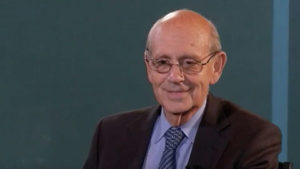Justice Stephen G. Breyer talks with high school students about the role and importance of dissenting opinions when the U.S. Supreme Court decides cases.
A Conversation on the Constitution with Chief Justice John Roberts Jr.: The Origin, Nature and Importance of the Supreme Court
Chief Justice John G. Roberts Jr. and a group of students discuss the U.S. Supreme Court: its history and evolution; how the justices select, hear and decide cases; and the role of an independent judiciary and other issues crucial to a healthy democracy today.
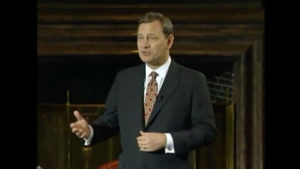
Constitution Class Videos
These 24 video lectures are part of an online course called Introduction to Key Constitutional Concepts and Supreme Court Cases, which is a project of the Annenberg Public Policy Center of the University of Pennsylvania and the University of Pennsylvania Law School.
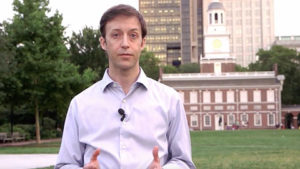
‘Supreme Law of the Land’: Supremacy Clause
In this lesson, students will explore the origins and evolution of the supremacy clause. How are conflicts between federal and state power resolved?
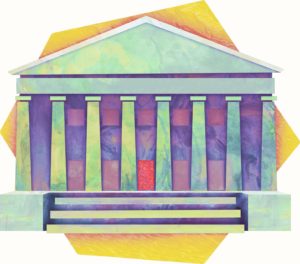
The Supremacy Clause: McCulloch v. Maryland
Tension between the states and the federal government has been a constant throughout U.S. history. This video explores the supremacy clause in Article VI of the Constitution and key moments in the power struggle, including the landmark case McCulloch v. Maryland.
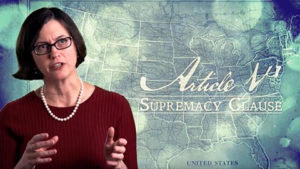
Article I
Article I creates the two sections of Congress – the Senate and the House – and outlines its powers and limits.
Article I – War Powers
The framers specified the powers of Congress in great detail in Article I, Section 8, of the Constitution. They include the power to declare war.
Making an Issue-Based Video
In this unit, students will learn how to take their research on a community-based issue that they care about and create a video. By showing their video to elected officials, policymakers, the general public and their peers, students may add their voices to the dialogue about community issues.
Campaign Curriculum – Spanish
This lesson for Spanish-speaking students requires students to analyze data, explain data, and articulate their ideas about civic participation.
Student Voices Campaign Curriculum – English
Students will: Interpret data about voting patterns by age group. Discuss possible reasons for current turnout statistics. Write an essay articulating why they think young people should vote.
Justice for All in the Courtroom
In this lesson, students analyze the interplay of processes and procedures that courts use to seat an impartial jury and gain appreciation for the essential role of juries in the justice system. They also explore the responsibilities and limits placed on government by the Constitution in the context of civil and criminal trials.
Key Constitutional Concepts: Creating a Constitution
The first section of the film “Key Constitutional Concepts” examines the creation of the U.S. Constitution and why it was needed. Before viewing the film, students are asked to respond to a key question, which will set a conversation in motion for the whole lesson.
Language of Deception
Critical Thinking
This lesson examines the ways in which terms that pack an emotional punch can add power to a statement – and also ways in which emotive meanings can be used to mislead, either by doing the reader’s thinking for him or by blinding her to the real nature of the issue.
Republicanism
Republicanism is a theory of government that emphasizes the participation of citizens for the common good of the community. The responsibilities and duties of citizens are paramount, and the exemplary citizen readily subordinates personal to public interests.
An Introduction to Democracy
We live in an era of democracy. A majority of the world’s people live in countries with a democratic form of government, and many others desire democracy. This is a startling new development.
Further Reading
Further reading suggestions for those interested in more on Understanding Democracy: a Hip Pocket Guide.
Virtue, Civic
Virtue is excellence in the character of a person. It refers to a desirable disposition, which can prompt individuals to be good persons and to do good things in regard to others and the community in general. Civic virtue refers to the dispositions or habits of behavior that direct citizens to subordinate their personal interests when necessary to contribute significantly to the common good of their community.
Unitary State
In a unitary state, the central or national government has complete authority over all other political divisions or administrative units.
State
A state is a political community occupying a specific territory that claims sovereignty or independence in the exercise of power over the people of its territory. The state or nation-state is the basic political unit of the international community.
Social Democracy
Social democracy is a system of political thought and action that calls upon the government to provide certain social and economic rights or entitlements necessary to the well being of all members of the community.
Separation of Powers
The separation of powers among three independent branches of government is a defining characteristic of the presidential system that characterizes the institutions of some constitutional democracies, such as Argentina, Brazil, Panama, the Philippines, and the United States of America.
Rule of Law
In a limited government administered according to the rule of law, the rulers use power following established principles and procedures based on a constitution. By contrast, when the rulers wield power capriciously, there is rule by the unbridled will of individuals without regard for established law.
Rights
A right is a person’s justifiable claim, protected by law, to act or be treated in a certain way. For example, the constitutions of democracies throughout the world guarantee the political rights of individuals, such as the rights of free speech, press, assembly, association, and petition.
Republic
A republic is a form of government based on the consent of the people and operated by representatives elected by the people. Hereditary rule by a monarchy or an aristocratic class is prohibited.
Presidential System
Some representative and constitutional democracies have a presidential system of government, which is based on the separation and sharing of powers among three independent and coordinate branches of government: legislative, executive, and judicial.
